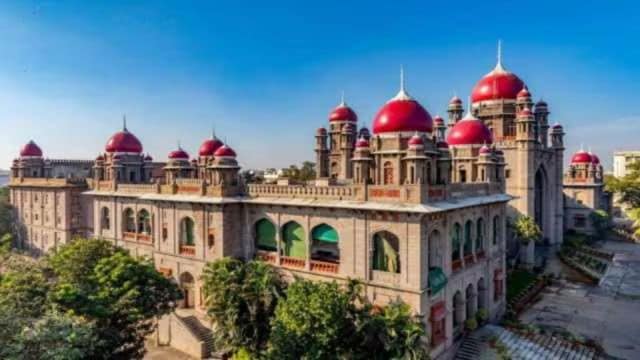The Telangana High Court Thursday ordered an interim stay of six weeks on the notification (GO MS 9) that enhanced Backward Classes reservation in the local bodies from 25 per cent to 42 per cent. The state government had issued the Government Order (GO) on September 26, based on which the state election commission had issued the election notification and schedule for the elections to local bodies, to be held in five phases between October and November. The interim stay on the GO has now derailed the election process.
As per the election schedule, the gram panchayat elections in Telangana were to be held in three phases – on October 31, November 4, and November 8, while the Mandal Parishad Territorial Constituency (MPTC) and Zilla Parishad Territorial Constituency (ZPTC) polls were scheduled on October 23 and 27, respectively. On Thursday evening, the state election commission issued a statement agreeing to abide by the directions of the high court.

The division bench of Chief Justice Aparesh Kumar Singh and Justice G M Mohiuddin, over Wednesday and Thursday, heard in detail the petitioners who challenged the government order (GO MS 9) which enhanced the reservations to Backward Class (BC) communities from 25 per cent to 42 per cent in the local bodies and the state which defended its legislations and subsequent notification to conduct local body elections.
In conclusion to hearing the batch of writ petitions, the division bench ordered four weeks for the state to file its counter affidavit and two weeks thereafter for the petitioners to file their replies, if so, advised. “In the meantime, there shall be an interim stay of the impugned notification. All implead applications are allowed,” the court said. Further, the bench noted that reasons for the interim judgment will be indicated: “Reasons will follow… we will indicate the detailed reasons.”
The Telangana government, on September 26, issued an order allocating 42 per cent reservation for Backward Classes in the upcoming local body elections to be held in multiple phases in October and November. A vacation bench, on September 27, heard the challenge to the GO in a House motion petition and questioned the lack of the Governor’s assent for the Bill and the urgency with which the order was issued, while posting the matter for hearing on October 8. The petitioners pointed out that with the BC reservation increasing from the present 25 per cent to 42 per cent, the overall reservation in the state will go up to 67 per cent.
While the petitioners challenged the government order on the grounds that the total 67 per cent reservation directly contravenes the Supreme Court’s mandate, particularly the landmark rulings in Indra Sawhney and K Krishna Murthy cases, which established the 50 per cent ceiling on vertical reservations, Advocate General A Sudharshan Reddy on Thursday cited various judgments to state that this 50 per cent cap is not applicable so far as political reservations are concerned. “The Court said what is applicable for higher education and public employment is not applicable in so far as reservations for political bodies are concerned. Therefore, my contention is that the 50 per cent cap borrowed from Indra Sawhney may not be correct here,” the AG stated.
Further, he submitted that in all the reservation-related cases in the past, it was for the first time in the country that empirical data of such nature had been collected, clearly showing the percentage of communities, which formed the basis for enhancing the BC reservations to 42 per cent. Citing Article 243-O of the Constitution, the AG added that the article bars courts from interfering in gram panchayat polls after the election notification is issued and said these laws, as passed by the state, cannot be questioned. The AG also reminded the court that the bill of March 17 was passed unanimously by the state legislature and forwarded to the Governor. He stated that based on judicial pronouncements (such as in ‘State of Tamil Nadu vs Governor’), there is a claim of “deemed assent”, making the bill an act without further notification.
Story continues below this ad
He concluded that the 42 per cent reservation for Backward Classes in Telangana’s local bodies is legally and constitutionally valid, based on comprehensive empirical data, unanimous legislative action, and is protected from judicial interference at this stage due to constitutional provisions.
Senior Advocate Ravivarma Kumar, appearing for the state, contended that the 50 per cent cap on reservations was not explicitly stated in the Constitution but was introduced by the Supreme Court in ‘M R Balaji v. State of Mysore’ (1963) as a judicially invented safeguard to protect the rights of non-reserved categories. He argued that the enhanced reservations have not affected the non-reserved categories (which constitute about 15 per cent in Telangana) in any manner.
Senior Counsel K Vivek Reddy, leading the petitioners, contended that the state government’s GO on political reservations is legally flawed on four main grounds. He argued that the order exceeds the 50 per cent ceiling mandated by the Supreme Court, a limit for which there is no exception for Backward Classes, and that the GO also violates the ‘Triple Test’ guidelines. Furthermore, Reddy asserted that the order contravened the state’s own legislation – the Telangana Panchayat Raj and Telangana Municipalities Acts – which explicitly impose the 50 per cent reservation limit. Finally, he pointed out that the reservation was applied uniformly across the entire state instead of being tailored to specific local bodies, and was improperly based on unpublished empirical data, thereby lacking transparency and legal validity.
After hearing the arguments at length, the court adjourned the hearing and posted the same after six weeks.









